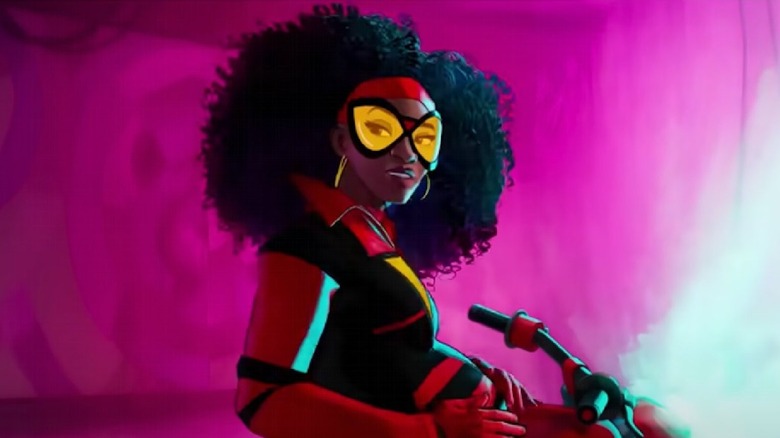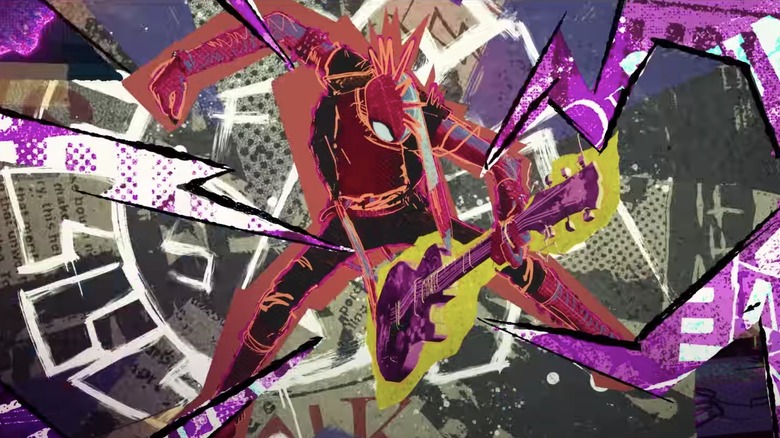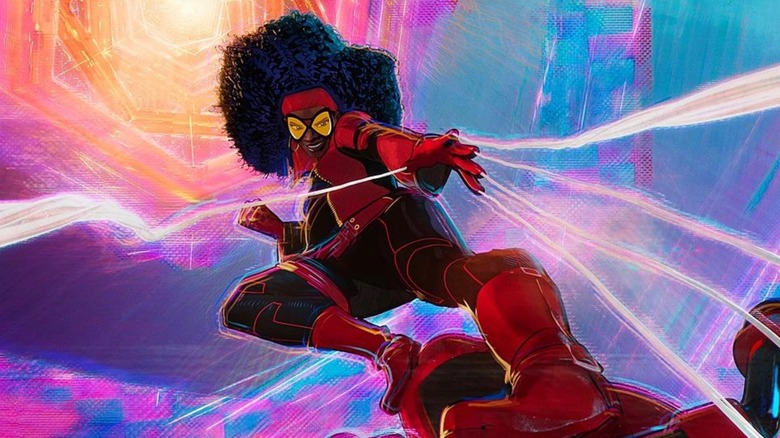Spider-Man: Across The Spider-Verse Is Personal For Both Issa Rae And Daniel Kaluuya - Exclusive Interview
In the new animated superhero adventure "Spider-Man: Across the Spider-Verse," the multiverse introduced in its predecessor, 2018's Oscar-winning "Spider-Man: Into the Spider-Verse," gets a whole lot bigger — and full of a lot more Spider-People.
While the first movie introduced us to alternate Spider-Heroes like Miles Morales, Peter B. Parker, and a Gwen Stacy from a different universe — as well as even more far-out characters like Peni Parker, Spider-Ham, and Spider-Man Noir — the new film brings us into different dimensions to meet Jessica Drew/Spider-Woman (voiced by Issa Rae), Hobie Brown/Spider-Punk (voiced by Daniel Kaluuya), and Miguel O'Hara/Spider-Man 2099 (voiced by Oscar Isaac), the latter of whom leads a team called the Spider Society that keeps all the various realities from collapsing.
In a storyline taken right from the comics, Jessica is very pregnant in the movie, while also riding a motorcycle and not using a secret identity. Hobie, meanwhile, is from the London district of Camden and reflects the area's punk leanings, even playing guitar and utilizing a costume that adapts aspects of punk culture and fashion. He battles a totalitarian regime that rules over the Earth of his universe (and is a bit different from his comic book counterpart).
Co-written and produced by Chris Miller and Phil Lord, and directed by Joaquim Dos Santos, Kemp Powers, and Justin K. Thompson, "Across the Spider-Verse" was a personal project for both Rae, who grew up a Spider-Man fan, and Kaluuya, who hails, like this version of Spider-Punk, from Camden. "I definitely wanted to sound like the people that I'm from," says Kaluuya, who previously appeared in Marvel's "Black Panther" and won an Oscar for his work in "Judas and the Black Messiah." "That was the most important thing."
Daniel Kaluuya and Issa Rae both had reasons to join the Spider-Verse
Daniel, what grabbed you about Spider-Punk? I read that you're both from the same part of London [Camden].
Daniel Kaluuya: The opportunity to be in the Spider-Verse is the reason why I'm doing this, and I love Kemp [Powers]; I love Chris [Miller] and Phil [Lord]. I wanted to work with them, I wanted to work in this world, I wanted to see how this process works, and it's been amazing to see how it develops. And Spider-Punk just felt cool. When I read him, I was like, "Oh, this is an interesting world. They wrote him in such an interesting way." The fact that he was from where I'm from ... I was like, "This is a dream to basically have a character that sounds like people where I come from." It was a lot of reasons.
Issa, I read that you grew up reading Marvel Comics.
Issa Rae: I grew up reading Spider-Man comics, yeah. I was drawn to his world. I was walking home from school one day — it was raining — I saw a Spider-Man comic on the ground, and I picked it up and started reading. It felt like my little secret, my little personal superhero, and I loved following the stories. [I] eventually started watching the cartoons and never outgrew him. I carried him through high school and college and have always been a fan of the movies and the life, so to get this call was tapping into everything that I love.
Did you go back and read Spider-Woman comics, or did you see this as an original take on the character?
Rae: I felt like it was still an original take on the character. I looked at this specific arc of her being pregnant, because I wasn't familiar with that before, so it was reading that and then getting a sense of what Phil, Chris, and Kemp wanted from Jessica Drew for this and seeing the parallels between her relationship and Gwen.
Finding inspiration to play comic book characters
Daniel, did you look at any real-life punk figures or even activist figures that you drew upon to get the voice?
Kaluuya: No, because Camden is very ... It's a punk culture. It's a very punky place, and it's an essence as opposed to a voice. It's a way of thinking. It's about, "I don't know about that; that sounds like you're lying." It's that mentality, and as long as you hold onto that sort of mentality, the voice does its own job. But I definitely wanted to sound like the people that I'm from. That was the most important thing.
When you do voice work for an animated film, how much do you get to see of the character, and how much does that help you? Is it comparable to the way that a costume fitting would help you get the character in a live-action film?
Rae: You don't get to see much. I didn't get to see my character until probably my second session — maybe second or third — and that was really eye-opening for me. I was like, "Oh, this makes so much sense." I didn't get to see clips from the movie or the animation until maybe midway through. That was also fulfilling. You're working in a vacuum outside of conversations with the filmmakers, who are super helpful and trying to clue you into their vision, but that's part of the challenge and the fun of it too.
Daniel, did you get any input into how Spider-Punk looked?
Kaluuya: No, they had their own ideas about how he looked. I was interested in how they saw him and how they were going to expand him visually. It was more about the voice and the sense of him and where he was coming from — [that's what] we collaborated on.
"Spider-Man: Across the Spider-Verse" opens in theaters on Friday, June 2.
This interview has been edited for clarity.


